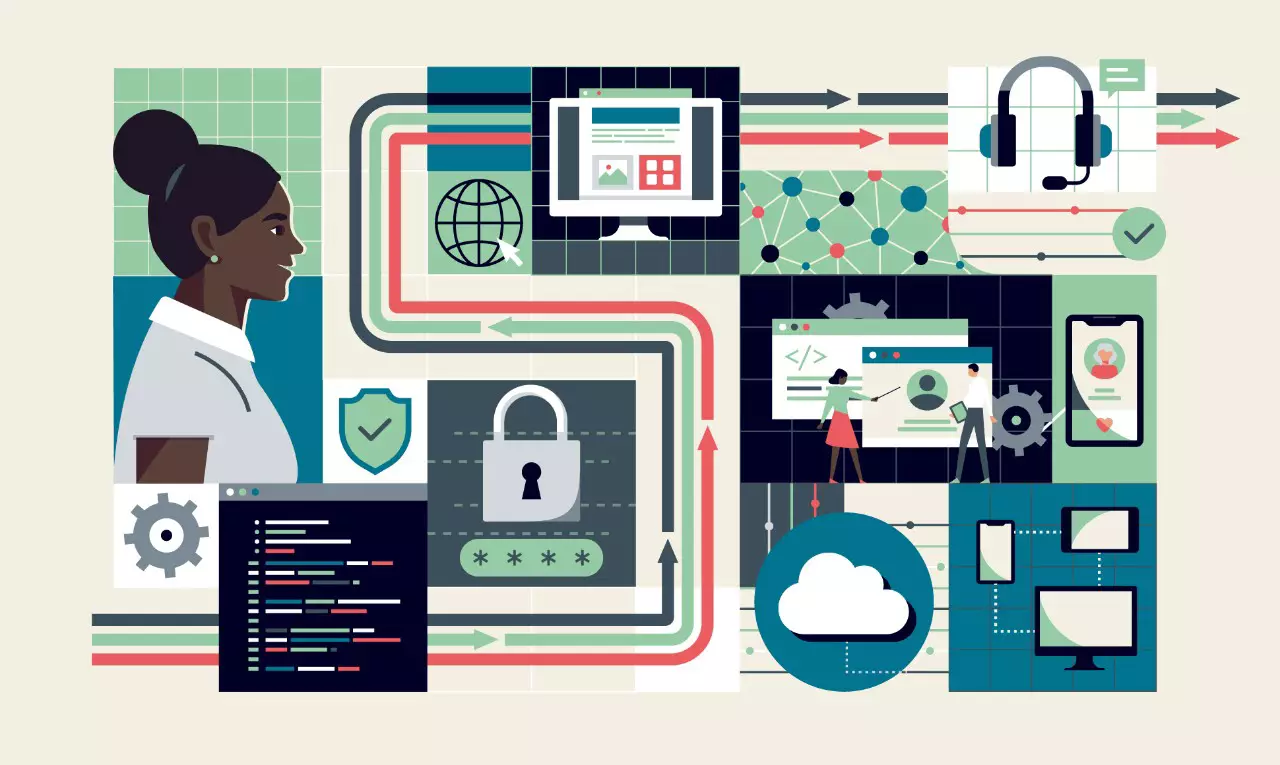Guide to careers in cybersecurity
This article was updated on February 22, 2024.

Whether you’re pursuing a degree in cybersecurity or looking to pivot into a related information security (infosec) career, there are several options to explore. Careers in cybersecurity are in high demand and can be a good fit for individuals interested in information technology (IT) and safeguarding digital systems.
Let’s look at how to get into cybersecurity, what you can do with a cybersecurity degree and more about the future of the cybersecurity industry. We also spoke with J.L. Graff, an associate dean in the College of Business and Information Technology at University of Phoenix, about how those interested can step into roles that use cybersecurity.
What is cybersecurity?
Cybersecurity is a specialized field within IT under the infosec umbrella. It focuses on protecting computer systems, networks, programs, devices and data from unauthorized access and malicious digital threats.
While IT is a broad field that harnesses digital technologies to store, retrieve, transmit and manipulate data, infosec and cybersecurity have emerged as crucial subsets given the vulnerability of digitally connected systems.
Some examples of the symbiotic relationship between cybersecurity and IT are:
- Leveraging technology like firewalls, antivirus software and intrusion detection technology to protect systems and data
- Securing hardware and software that forms an organization’s core IT infrastructure
- Configuring and administrating IT systems, networks and databases
- Helping set technology policies and controls for identity management, access controls and acceptable use
- Ensuring business continuity procedures are intact, enabling IT systems to maintain uptime
Why is cybersecurity important?
Cybersecurity aims to reduce the risk of cyberattacks and safeguard organizations and individuals whose systems are connected to the internet. This includes securing both private networks and end-user devices.
Effective cybersecurity manages threats from numerous sources, including fraudsters, hackers, malware, denial-of-service attacks and data breaches.
The cybersecurity arm of IT plays a pivotal role in safeguarding the operations, data integrity and reputation of some of the largest industries across sectors like:
- Financial services: Banks and other financial institutions handle sensitive consumer data, such as Social Security numbers, credit card numbers and bank account details. Cybersecurity is crucial to prevent unauthorized money transfers and identify theft-related fraud.
- Healthcare: From patient medical records to lifesaving connected devices, cybersecurity impacts healthcare in multiple ways, ranging from healthcare privacy regulations to quality of care.
- Energy: Power plants and grid infrastructure now rely on vulnerable industrial Internet of Things (IoT) networks. Cyberattacks in the energy sector can debilitate cities and jeopardize public safety.
- National defense: Protection of classified intelligence around state security details requires strict cybersecurity protocols in military and aerospace systems.
- Technology: From source code to customer data, cybersecurity is required for tech providers to adequately protect proprietary and personal information, maintain partner trust and avoid IP loss in fiercely competitive markets.
The importance of cybersecurity means employment opportunities continue to expand. The demand for skilled cybersecurity professionals to mitigate cyberattacks continues to grow as technology advances and the world becomes more digitally connected. Data from the U.S. Bureau of Labor Statistics (BLS) projects employment of information security analysts to grow by 32% from 2022 to 2032.
BLS Occupational Employment Projections, 2022-2032 is published by the U.S. Bureau of Labor Statistics. This data reflects BLS’ projections of national (not local) conditions. These data points are not specific to University of Phoenix students or graduates.
Careers in cybersecurity
Job growth isn’t the only advantage cybersecurity has to recommend it. Careers in this field offer additional advantages like learning opportunities, the chance to make a positive impact in one’s organization and the ability to leverage cutting-edge technology.
Graff states: “Explore the many different careers in IT such as cybersecurity, computer science, data science, software development, cloud computing, network defense, information security and more. Within these broad IT fields, you can delve into machine learning, virtual reality, Internet of Things, artificial intelligence, ethical hacking, sniffing and network analysis, penetration testing and cloud technologies. These emerging technologies are revolutionizing organizations and how we function day-to-day.”
Entry-level cybersecurity roles
Kicking off a career in cybersecurity can start with acquiring a cybersecurity certificate or associate degree. For example, University of Phoenix offers the following programs:
Options like those can help expedite the enhancement of your knowledge and experience, which can be attractive for individuals working in the field and looking to upskill quickly.
Asked if one needs a college degree to work in cybersecurity, Graff states: “Based on my research and conversations with employers and cybersecurity professionals, those interested in cybersecurity would greatly benefit from a degree as it will help students expand their knowledge and skills and prepare them for careers in cyber. A degree can prepare you for more job opportunities as many organizations still require employees to have an IT degree. A degree will also expose students to the many areas in cybersecurity and establish a strong foundation to build upon. I encourage those interested in cybersecurity to earn industry certifications during or soon after the completion of a degree.”
Entry-level roles may require candidates to hold a certificate, an associate degree or fewer than three years of real-world experience to qualify.
As you grow in your career, you might seek roles designed for more experienced candidates who hold a bachelor’s degree or specific third-party security certifications or certificates.
A bachelor’s degree — such as a Bachelor of Science in Cybersecurity from University of Phoenix — provides foundational knowledge and skills that benefit a cybersecurity career. The comprehensive UOPX degree program can strengthen your technical expertise, widen your cybersecurity skill set and help prepare you for more advanced roles and certifications. It can also help prepare you for cybersecurity leadership roles.
An individual with a degree in cybersecurity can pursue several careers. Below are just a few you can obtain with an advanced certificate, an associate degree or a bachelor’s degree.
Note: Titles and responsibilities vary across industries and organizations.
- Information security specialist — Creates and enacts security measures so that a company’s or organization’s computer networks and systems stay protected.
- Computer security analyst — Protects networks and systems from cyber threats and restores protection if needed.
- IT specialist — Typically maintains and repairs computer networks as needed and may also assist with other technology at a company office or organization.
- Systems analyst — Evaluates database programs and resolves user issues.
- Information systems supervisor (also known as an information systems manager) — Typically oversees other IT professionals with the overall goal to maintain a company’s or organization’s computer systems.
- IT systems security analyst — Maintains and monitors a company’s or organization’s computer networks to ensure there are no security breaches.
Roles such as those help students learn how to integrate elements of security in a networked environment, and how to coordinate the use of information security tools within an organization.
Advanced or senior-level cybersecurity roles
Master’s degrees in computer science, IT or cybersecurity are sometimes required for more senior positions in the industry. Enrolling in a master’s degree program — such as an online cybersecurity master's degree at University of Phoenix — will teach you more in-depth knowledge about the field to complement your experience and undergraduate education.
The master's in cybersecurity online program teaches advanced topics like:
- How to better spot security vulnerabilities hackers might exploit
- How to develop an incident response
- How to determine which preexisting security policies need to be updated
- How to implement new security policies
Here are some common advanced or senior-level cybersecurity role titles:
- Network security analyst — Helps protect companies’ networks from cyber threats.
- Security analyst — Works to find and fix issues within a security system by accessing threats and cyberattacks.
- Information security officer — Typically creates risk management plans for IT systems and monitors networks and other computer systems.
Types of cybersecurity degrees
Starting your degree in cybersecurity or enhancing your cybersecurity education is easy at University of Phoenix. Several degree programs and certificate options answer a variety of needs and interests.
- Information Assurance and Security Certificate: Gain technical skills in information systems, wireless networking, cybersecurity, cryptography and systems security in as little as seven months.
- Advanced Cybersecurity Certificate: Develop technical knowledge to step into the fast-growing field of IT security, helping keep computer systems safe from data breaches and cyberattacks.
- Cyber and Network Defense Certificate: Take a proactive approach to network security by spotting weaknesses before hackers can exploit them. This certificate program prepares you to take the EC-Council Certified Ethical Hacker (CEH) exam.
- Associate of Science in Cybersecurity: Courses align to the following certifications: Certified Ethical Hacker (CEH), Certified Network Defender (CND) and Certified Secure Computer User (CSCU). This program was awarded the EC-Council’s 2019 and 2023 Academic Circle of Excellence Award and is designed to help you develop problem-solving skills and techniques needed to defend the cyber domain.
- Bachelor of Science in Cybersecurity: Learn how to build secure firewalls, deter hacker attacks and help maintain system protection.
- Master of Science in Cybersecurity: Gain a deeper understanding of how to protect data through a variety of cyber defenses, including cloud security, threat intelligence and secure programming.
Skills needed for cybersecurity
A career in cybersecurity requires a mastery of several hard and soft skills. A successful cybersecurity professional will demonstrate the ability to balance these skills daily.
Hard skills
According to the Center for Strategic and International Studies, employers search for cybersecurity professionals with foundational hard skills, including an understanding of:
- Computer, cloud and blockchain architecture and security
- IoT
- Data management
- Cryptography
- Networking
- Secure coding principles
- Operating system internals
- Proficiency with Linux-based systems
- Fluency in low-level scripted and compiled programming languages, such as Python, SQL and Java
- Familiarity with common exploitation methods and mitigation techniques
- Familiarity with cybersecurity policy planning and compliance audits like HIPAA, PCI DSS, NIST and ISO standards.
Security certifications such as:
- Certified Ethical Hacker (CEH)
- Certified Network Defender (CND)
- Certified Secure Computer User (CSCU)
- Cybersecurity Analyst (CySA+)
Soft skills
Here are five soft skills cybersecurity professionals need, according to the Infosec institute:
- Problem-solving: Analyze and resolve complex problems in a variety of contexts.
- Communication: Effectively communicate with key team members and explain complex processes or programs to stakeholders.
- Analytical thinking: Apply analytical skills to evaluate systems, identify vulnerabilities and deduce effective solutions.
- Collaboration: Work together with other security or IT teams to protect data.
- Attention to detail: Successfully identify anomalies, risks and threats before incidents occur.
Cybersecurity salaries
A career in cybersecurity may provide a good salary, depending on the role, your location, the amount of education you have and the certificates you’ve earned along the way.
According to BLS:
- As of May 2023, computer systems analysts earned between $63,230 and $165,700, with a median wage of $103,800, according to BLS.
- As of May 2023, network and computer systems administrators earned between $69,210 and $182,370, with a median wage of $120,360, according to BLS.
- As of May 2023, information security analysts earned between $69,210 and $182,370, with a median wage of $120,360, according to BLS.
Salary ranges are not specific to students or graduates of University of Phoenix. Actual outcomes vary based on multiple factors, including prior work experience, geographic location and other factors specific to the individual. University of Phoenix does not guarantee employment, salary level or career advancement. BLS data is geographically based. Information for a specific state/city can be researched on the BLS website.
Earning a degree in cybersecurity at University of Phoenix
University of Phoenix offers flexible online course collections, certificates, bachelor’s degrees and master’s degrees to accommodate established and aspiring IT professionals looking to enhance their knowledge in this field. Learn more about undergraduate and graduate online technology degrees from UOPX and start your IT journey today!
- Associate of Science in Cybersecurity — This 63-credit degree program is designed to help you develop the career-relevant skills and techniques needed to defend the cyber domain from cybersecurity risk.
- Bachelor of Science in Cybersecurity — This online program teaches skills such as security policies, network security, cybersecurity and more. You’ll also learn how to examine an organization’s infrastructure to ensure compliance with cybersecurity standards and policies and how to prevent cyberattacks.
- Master of Science in Cybersecurity — This online program explores cybersecurity, security policies and vulnerability. Learn how to design elements of an enterprise using standards and tactics in cybersecurity, consider ethical and privacy protocols in enterprise cybersecurity, and implement cybersecurity frameworks and policies in risk management.
- Advanced Cybersecurity Certificate — Within this program, you can develop the technical knowledge to step into the fast-growing field of IT security, helping keep computer systems safe from data breaches and cyberattacks. Get real-life experience through hands-on IT labs and simulations while developing a broad knowledge of cybersecurity to help prepare you for your technology career.
- Cyber and Network Defense Certificate (Undergraduate) — Learn how to address a data breach or cyberattack before it happens. This certificate can show you how to take a proactive approach to network security by spotting weaknesses before hackers can exploit them. Content in this certificate program educationally prepares you to take the EC-Council Certified Ethical Hacker (CEH) exam.
If you’re interested in learning more about what next steps might look like, be sure to consult a University of Phoenix academic advisor or admissions representative for more information.

ABOUT THE AUTHOR
Brian Fairbanks is a freelance writer with a background in SEO content creation and blog article development

ABOUT THE REVIEWER
Currently Dean of the College of Business and Information Technology, Kathryn Uhles has served University of Phoenix in a variety of roles since 2006. Prior to joining University of Phoenix, Kathryn taught fifth grade to underprivileged youth in Phoenix.
This article has been vetted by University of Phoenix's editorial advisory committee.
Read more about our editorial process.
want to read more like this?


